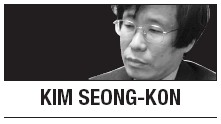Foreigners often wonder, “China and Japan have a number of cultural icons such as kung fu and samurai. Does Korea have any cultural icons?” An American scholar recently suggested the “seonbi” as a cultural icon of Korea.
“Seonbi” refers to virtuous scholars who did not seek monetary gain or mundane pleasures during the Joseon Dynasty. The seonbi could be a fine cultural icon of Korea, although similar personas can be found in Chinese history, too.

Another good example is the image of the Korean mother. It serves an even better cultural icon of Korea. The “Korean mother” would be an excellent cultural icon of Korea, as mothers have been traditionally praised in Korean literature, film and music for their exceptionally sacrificial nature.
Perhaps that is why Koreans are emotionally attached to their mothers, and the bonding between a mother and her children is so strong in Korean society. And perhaps that is why our largest denomination of paper money, the 50,000 won bill, has a woman’s portrait who is known to be the great mother of a famous scholar in 16th-century Korea.
Of course, any culture will have wonderful, sacrificial mothers and bad ones as well. In fact, most people around the world esteem mothers and praise them for their everlasting love and sacrifice.
To the Korean people, however, “mother” means much more than that; Koreans think of their mother as a very special, angelic being who, like Mother Nature, endlessly nurtures, embraces and comforts them when they are hurt, confused and alone. Indeed, “the mother figure” serves as a life-saving force and has a special place in Korean literature and culture. And a Korean would never forget his mother as long as he lives.
In Korea, the image of a mother is closer to a bird. A mother bird, when raising children, does not eat anything all day; she is busy catching worms and feeding her babies in the nest. Like a mother bird, Korean mothers are willing to sacrifice themselves for their children. In Korea, therefore, the word “mother” always evokes the sweetness of care and affection, mercy and sacrifice, home and nostalgia.
When Koreans are homesick, therefore, they intensely miss their mother. In Korea, a home without a mother is not a home. Koreans easily become sentimental and nostalgic whenever they think of their mother. Indeed, there is an everlasting, tenacious bond between a Korean and his or her mother. In Korea, therefore, mothers continue to live inside their children’s sweet memories even after they are deceased.
Obviously, mothers in other countries, too, love their children. Their practices, however, can be different from Korean mothers in many ways. Compared to Korean mothers, for example, American mothers seem to be reluctant to forgo their personal lives for their children.
I have an American friend who, like other American parents, sends her children to their bedroom at 8 o’clock in the evening. I asked, “Why do you send your children upstairs so early?” She answered without hesitation, “I need my own time too.” Of course, she had a point. Nevertheless, it occurred to me that if she were a Korean mother, she would not do that. In the eyes of a Korean mother, it would look too selfish.
“The Big Bang Theory,” too, well illustrates the difference between Korean and American mothers. Granted that it is a comedy designed to make us laugh, the sitcom still exhibits some characteristics, albeit exaggerated, of American mothers through Sheldon and Leonard’s mothers. Compared to Korean mothers, the two American mothers are often too generous, indifferent and even negligent under the slogan of “Let our children be independent.”
Throughout modern history, Korean mothers have been not only sacrificial but also exceptionally strong. They survived the harsh days of Japanese colonialism, the devastating Korean War, and the many subsequent political upheavals that tore through the country.
Indeed, it was Korean mothers who cleaned up the debris of the war and raised their children in destitute situations. Korean mothers rebuilt homes, educated their children and endured poverty and catastrophe. And that is not all. Each time the college entrance exam policy was altered, creating chaos and confusion, Korean mothers managed to navigate the new system and help their children enter college successfully. We say, “Behind every great man, there is a great woman.” In Korea, the great woman is primarily your mother, and then perhaps your wife.
Korean mothers are exceptionally dedicated and devoted to their children. When it comes to their children, they are ready to sacrifice their lives at any time. Shin Kyung-sook’s award-winning novel, “Please Look after Mom,” insightfully explores the meaning of “mother” in Korean society.
The novel’s status as a New York Times Book Review bestseller shows that the story of a Korean mother appealed to the American mind as well. Indeed, it may be a good idea to promote the image of the “Korean mother” as an icon of Korean culture in the international community. Korean mothers are so unique and exceptional, after all.
By Kim Seong-kon
Kim Seong-kon is a professor of English at Seoul National University and president of the Literature Translation Institute of Korea. He can be reached at sukim@snu.ac.kr. ― Ed.





![[Herald Interview] 'Trump will use tariffs as first line of defense for American manufacturing'](http://res.heraldm.com/phpwas/restmb_idxmake.php?idx=644&simg=/content/image/2024/11/26/20241126050017_0.jpg)

![[Exclusive] Hyundai Mobis eyes closer ties with BYD](http://res.heraldm.com/phpwas/restmb_idxmake.php?idx=644&simg=/content/image/2024/11/25/20241125050044_0.jpg)
![[Herald Review] 'Gangnam B-Side' combines social realism with masterful suspense, performance](http://res.heraldm.com/phpwas/restmb_idxmake.php?idx=644&simg=/content/image/2024/11/25/20241125050072_0.jpg)